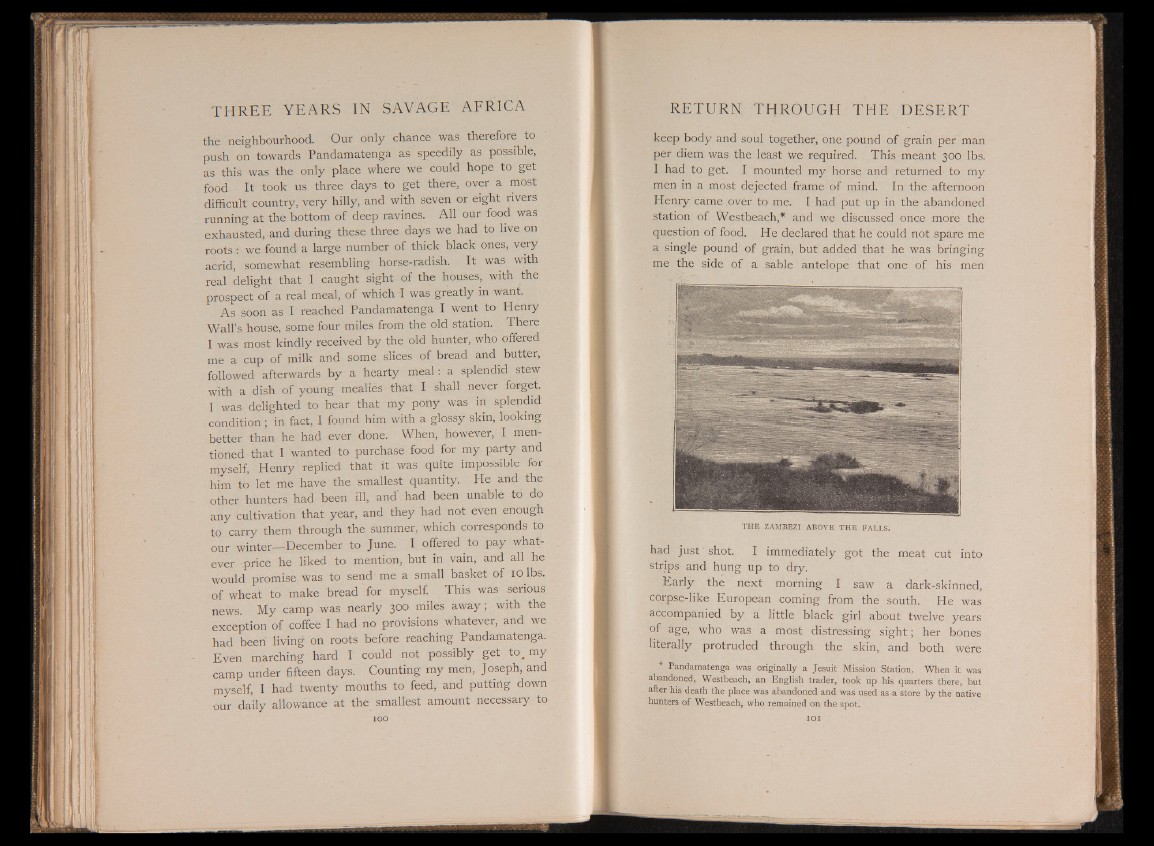
the neighbourhood. Our only chance was therefore to
push on towards Pandamatenga as speedily as possible,
as this was the only place where we could hope to get
food. It took us three days to get there, over a most
difficult country, very hilly, and with seven or eight rivers
running at the bottom of deep ravines. All our food was
exhausted, and during these three days we had to live on
roots: we found a large number of thick black ones, very
acrid, somewhat resembling horse-radish. It was with
real delight that I caught sight of the houses, with the
prospect of a real meal, of which I was greatly in want.
As soon as I reached Pandamatenga I went to Henry
Wall’s house, some four miles from the old station. There
I was most kindly received by the old hunter, who offered
me a cup of milk and some slices of bread and butter,
followed afterwards by a hearty meal: a splendid stew
with a dish of young mealies that I shall never forget.
I was delighted to hear that my pony was in splendid
condition; in fact, I found him with a glossy skin, looking
better than he had ever done. When, however, I mentioned
that I wanted to purchase food for my party and
myself, Henry replied that it was quite impossible for
him to let me have the smallest quantity. He and the
other hunters had been ill, and had been unable to do
any cultivation that year, and they had not even enough
to carry them through the summer, which corresponds to
our winter—December to June. I offered to pay whatever
price he liked to mention, but in vain, and all he
would promise was to send me a small basket of iolbs.
of wheat to make bread for myself. This was serious
news. My camp was nearly 300 miles away; with the
exception of coffee I had no provisions whatever, and we
had been living on roots before reaching Pandamatenga.
Even marching hard I could not possibly get to, my
camp under fifteen days. Counting my men, Joseph, and
myself, I had twenty mouths to feed, and putting down
our daily allowance at the smallest amount necessary to
keep body and soul together, one pound of grain per man
per diem was the least we required. This meant 300 lbs.
I had to get. I mounted my horse and returned to my
men in a most dejected frame of mind. In the afternoon
Henry came over to me. I had put up in the abandoned
station of Westbeach,* and we discussed once more the
question of food. He declared that he could not spare me
a single pound of grain, but added that he was bringing
me the side of a sable antelope that one of his men
THE ZAMBEZI ABOVE TH E FA LL S .
had just' shot. I immediately got the meat cut into
strips and hung up to dry.
Early the next morning I saw a dark-skinned,
corpse-like European coming from the south. He was
accompanied by a little black girl about twelve years
of age, who was a most distressing sight; her bones
literally protruded through the skin, and both were
* Pandamatenga was originally a Jesuit Mission Station. When it was
abandoned, Westbeach, an English trader, took up his quarters there, but
after his death the place was abandoned and was used as a store by the native
hunters of Westbeach, who remained on the spot.